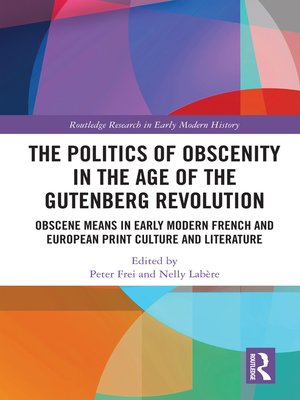The Politics of Obscenity in the Age of the Gutenberg Revolution
ebook ∣ Obscene Means in Early Modern French and European Print Culture and Literature · Routledge Research in Early Modern History
By Peter Frei

Sign up to save your library
With an OverDrive account, you can save your favorite libraries for at-a-glance information about availability. Find out more about OverDrive accounts.
Find this title in Libby, the library reading app by OverDrive.



Search for a digital library with this title
Title found at these libraries:
| Library Name | Distance |
|---|---|
| Loading... |
What does obscene mean? What does it have to say about the means through which meaning is produced and received in literary, artistic and, more broadly, social acts of representation and interaction? Early modern France and Europe faced these questions not only in regard to the political, religious and artistic reformations for which the Renaissance stands, but also in light of the reconfiguration of its mediasphere in the wake of the invention of the printing press. The Politics of Obscenity brings together researchers from Europe and the United States in offering scholars of early modern Europe a detailed understanding of the implications and the impact of obscene representations in their relationship to the Gutenberg Revolution which came to define Western modernity.







